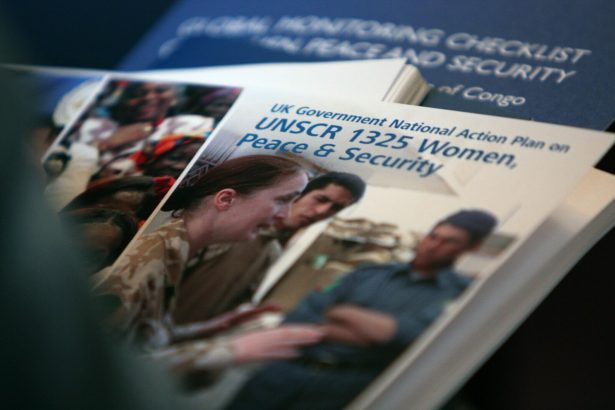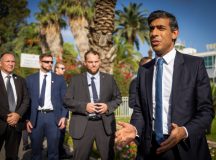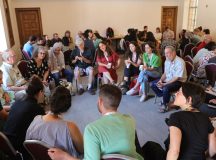Rachael Liss of the Alliance for Middle East Peace’s (ALLMEP) outlines the importance of the Women, Peace, and Security (WPS) agenda in the Israeli-Palestinian context. In the wake of the UK’s commitment to establishing an International Fund for Israeli-Palestinian Peace, Liss argues for increased funding to an area which, ‘despite [its] proven effectiveness and deep expertise… remains underfunded, politically marginalised, and increasingly threatened by shrinking civic space.’
We are living through a period of profound global disruption. Long-standing international norms are crumbling, conflict is intensifying, and the institutions built to manage peace and security often appear outpaced or out of touch. Nowhere is this breakdown more visible – or more urgent – than in the Israeli-Palestinian conflict, where decades of diplomatic neglect and international disengagement have culminated in its most devastating chapter to date.
Among those most affected: women and girls. As in so many conflicts, they have borne the brunt of violence. But they are also among the first to respond – providing stability, leadership, and community in the vacuum left by failed diplomacy.
Women have always been present in the struggle for peace between Israelis and Palestinians – leading movements, reconciling communities, and holding the social fabric together through waves of violence. But they have rarely been given the opportunity to shape policy or peace processes. This exclusion is not only unjust; it is short-sighted. Research shows why: as Women, Peace, and Security (WPS) expert Laurel Stone has illustrated, when women are involved in peace processes, agreements are 35 per cent more likely to last at least fifteen years[1]. These are not abstract statistics – they reflect measurable impact and missed opportunities when women’s voices are sidelined.
31 October 2025 marked the 25th anniversary of UN Security Council Resolution 1325 on WPS, which recognises the critical role of women in conflict resolution and the need for their full, equal, and meaningful participation in peace and security efforts. Two and a half decades later, the gap between international commitments and actual inclusion remains stark – a reality sharply reflected in the Israeli-Palestinian context.
Women have rarely been represented at the senior official level in Israeli‑Palestinian peace negotiations, with only a handful ever moving beyond advisory roles and still fewer occupying lead negotiating positions. This lack of representation is also reflected in the political sphere – as of October 2025, no women serve on the Palestine Liberation Organisation Executive Committee, and women make up only 24 per cent of the Knesset.[2][3]
Yet at the grassroots level, women are not only present – they are indispensable. Over 75 per cent of ALLMEP member organisations have women in senior leadership positions. Half have at least one woman in their executive leadership teams.
Women leading civil society organisations perform functions that top-down diplomacy consistently fails to deliver. First, they build momentum, legitimacy, and trust for peace outside formal political frameworks by centering the experiences of those most affected and marginalised groups, including women, minority populations, religious communities and youth. Through public initiatives and educational campaigns, they ground political and diplomatic solutions in lived realities. Second, women develop new ideas, leadership, and political dynamics by bringing perspectives shaped by everyday social, economic, and familial networks. This leads to more inclusive, practical, and resilient solutions, while also enabling dialogue which men-dominated spaces sometimes overlook. Finally, they strengthen accountability: by amplifying marginalised voices, documenting inequities, and challenging both formal and informal power structures, women leaders ensure that commitments to peace translate into tangible, equitable outcomes.
And again, research backs this up: as civil war scholar Desirée Nilsson has shown, peace processes with civil society input are 64 per cent less prone to fail.[4]
Yet, despite their proven effectiveness and deep expertise – this work remains underfunded, politically marginalised, and increasingly threatened by shrinking civic space. Even when women are ‘involved’, it is often in a tokenistic way. Too often, they are included in consultations but excluded from decision-making; their voices are acknowledged, but their recommendations go unheeded; they are present, but rarely given influence to shape outcomes.
Encouragingly, international policymakers appear – finally, if slowly – to be acknowledging this imperative.
At the French-Saudi High-Level International Conference for the Implementation of the Two-State Solution in July, the New York Declaration[5] – co-written by the 19 international co-chairs of the conference – emphasised the need to integrate women into diplomatic processes, and to ensure that reconstruction and post-conflict recovery efforts prioritise women-led initiatives and businesses. These priorities strongly mirror those advanced by Israeli and Palestinian civil society leaders[6] earlier in June at the Paris Peace Call – hosted by President Macron and co-organised by ALLMEP – where hundreds of Israeli and Palestinian civil society leaders convened to generate ideas together ahead of the NY conference, modelling what inclusive, grassroots-led diplomacy can look like in practice.
This is also why the UK’s commitment to establishing an International Fund for Israeli-Palestinian Peace (IFP)[7] is so vital. Amid deep cuts to UK Official Development Assistance – cuts that, according to the government’s own Equality Impact Assessment, disproportionately affect WPS programming[8] – there has never been a greater need for smart, multilateral investments that can protect and scale up the work of women-led peacebuilding organisations. As aid budgets continue to fall – as they are across Europe and the US too – women-led civil society efforts, especially in conflict zones, are often the first to suffer. The UK’s WPS programme alone is facing a 25 per cent reduction.
But through pooled, multilateral mechanisms, international donors can help sustain the work of women-led civil society at scale, in a way that no single donor can. This is the rationale behind the proposed International Fund. And for this fund to be truly transformative, gender equity must be baked into its design and implementation. Funding women-led organisations, building the role of women directly into the frameworks, and ensuring that women peacebuilders are not just invited to speak but resourced to lead.
If the UK, and the rest of the international community, is serious about advancing a just and lasting peace between Israelis and Palestinians, it must prioritise the actors most capable of delivering it.
[1] Laurel Stone, “Quantitative Analysis of Women’s Participation in Peace Processes,” Annex II in “Reimagining Peacemaking: Women’s Roles in Peace Processes.” (2015).
[2] Inter-Parliamentary Union (IPU). (2021). “Women in national parliaments.”
[3] ECFR. (2025). https://ecfr.eu/special/mapping_palestinian_politics/executive_committee/
[4] Desirée Nilsson, “Anchoring the Peace: Civil Society Actors in Peace Accords and Durable Peace,” International Interactions 38, No. 2 (2009)
[5] New York Decleration: https://static-cdn.toi-media.com/www/uploads/2025/07/NV_High-Level-Conference-Outcome-document.pdf
[6] Recommendations from Israeli and Palestinian Civil Society for UN Working Groups on Advancing a Two-State Solution: https://drive.google.com/file/d/1dRHRIDR8SN-I7ONFIceGkVzGfzwsiPRo/view
[7] Starmer inspired by Northern Ireland to launch project for peace in Israel-Gaza: https://www.independent.co.uk/news/uk/politics/starmer-peace-israel-gaza-northern-ireland-b2665934.html
[8] Equality impact assessment of Official Development Assistance (ODA) programme allocations for 2025 to 2026: https://www.gov.uk/government/publications/fcdo-official-development-assistance-programme-allocations-2025-to-2026-equality-impact-assessment/equality-impact-assessment-of-official-development-assistance-oda-programme-allocations-for-2025-to-2026




































